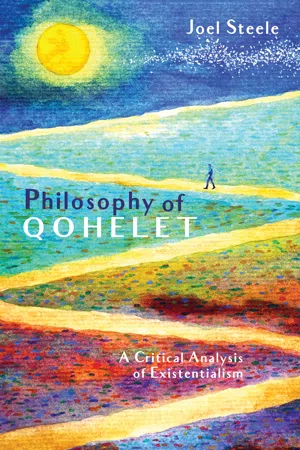![]()
Chapter 3
Historical Context and Background
The date of the composition for the book of Ecclesiastes is highly contested and the ranges vary considerably. The dating is not a primary concern for this work beyond casting doubt on claims that Hellenistic sources influenced the philosophy of this Old Testament author. Nevertheless, the Greek language had an impact on late Jewish communities, but only in terms of their ability to communicate their already established writings. The Septuagint, for example, uses the Greek version εκκλησιαστής from the Greek root εκκλησία, meaning: assembly, gathering, summoned legislative body, church. This Greek word is substituted for the Hebrew word קֹהֶלֶת (Qohelet). The Greek word εκκλησιαστής translates phonetically into English as Ecclesiastes, the title of the book. There are a few instances where the ending of the Hebrew word indicate it may represent a vocation. In one occurrence, it is preceded by the definite article suggesting it is a title. Some English translations use the word “teacher” or “preacher.” Thus, because of these discrepancies, i.e., inability to prove the identity of original author, many scholars have chosen to use the untranslated Hebrew word—Qohelet.
The book of Ecclesiastes is typically assigned to wisdom literature. Certain books in this genre clearly demonstrate that a person’s character has no impact on their good or bad fortune in life. Job’s circumstances, for example, portrayed an instance where the innocent suffer. That same mentality is confirmed here by Qohelet. According to Qohelet, God’s disposition is unknowable. Apparently, there exists a decree that God has withheld from humanity. Some scholars claim there is a conflict among wisdom literature. Proverbs, for example, seems to affirm that the fear of God guarantees long life and prosperity. Perhaps an argument could be made that these statements found in Proverbs are value statements and not promises or guarantees. Moreover, the eternal or metaphysical aspect is often overlooked and assumptions are made pertaining to the immediate physical well-being of an individual.
Qohelet is unique; unlike Mesopotamian wisdom, he does not attempt to predict events by observing signs. Even cycles in nature are unpredictable, other than the fact that they will reoccur—when and how remain uncertain. Unlike Job, he refused to address God, instead he complained to his own heart. He rejects the notion that there exists any pattern or preference of victims chosen by death. Some scholars have advocated for a disturbing narrative in Qohelet’s philosophy. They argue that Qohelet is demonstrating that there is no distinction between the beasts and humans—both will die. Further, there is no comfort from the thought of them returning to their source. It is true that the same sovereign deity that gives life may also recall it and humans have limited power to correct inequalities. It is for these reasons Qohelet declared an avenue that is essential for individuals to pursue. He recognized that in the absence of an eternal and objectifiable source, death destroys all of humanity’s advancements. The ability to reason at this level distinguishes humans from beasts. It is the reality of this problem that leads to paralysis for many individuals. For those who do not recognize an eternal objectifiable source, human life is just as meaningless as the life of beasts. Consumed with fear, death has a grip on the unreasonable long before they die. Nearing the end of the book, Qohelet promoted “the fear of the Lord.” He distinguished between those who fear God and the evildoers who do not fear God. Fearing God was not about extending one’s life—he made this clear “though sinners do evil a hundred times and prolong their lives. . .” (Eccl 8:12). This passage was concerning divine judgment after life on earth. This work will not argue against the prevailing theory concerning Near Eastern beliefs pertaining to the netherworld or Sheol. It is presumed, however, that Enoch was presented with an alternative to Sheol, leaving the possibility open. Nonetheless, in his final statement, Qohelet expressed the importance of fearing God. “Fear God, and keep his commandments; for this is the whole duty of everyone” (Eccl 12:13). The passage in 8:12 supports the argument and does not solely depend on whether the last verses of the final chapter are accepted as original or the work of an editor. Furthermore, Qohelet’s existential philosophy, which advocates for pursuing pleasure in certain activities, contains this key element (the fear of the Lord) in other books of wisdom literature.
The Fear of the Lord
The phrase “the fear of the Lord” is central to the book of Proverbs. It calls for a reverence and obedience to God that will foster virtuous behavior. Moreover, the phrase is part of a statement that is exclusive to Israelite writings, not prevalent in the Wisdom texts of Egypt or Mesopotamia. The English word “fear” was derived from the Hebrew word יִרְאַ֣ת (yir’ah). Meaning: to fear, to reverence. The English word “Lord” was derived from the Hebrew word יְ֭הוָה (yeh-ho-vaw), Meaning: “Jehovah, pr. name of the supreme God amongst the Hebrew.” The phrase is used three times in the first two chapters of Proverbs. It is found in the following verses: Proverbs 1:7, occurring in a positive setting corresponding to knowledge—a statement. Proverbs 1:29, occurring in a negative setting corresponding to knowledge—the result of not choosing to fear the Lord. Proverbs 2:5, in a positive setting corresponding to knowledge, but beyond the simple statement made in Proverbs 1:7. In Proverbs 2:5, the author provided more detail related to the phrase; explaining when the student would “understand the fear of the Lord.” This is evident in the previous four verses, that is, understanding comes through commitment, obedience, requests, and seeking (Prov 2:1–4).
Francis Brown, R. Driver, and Cha...
